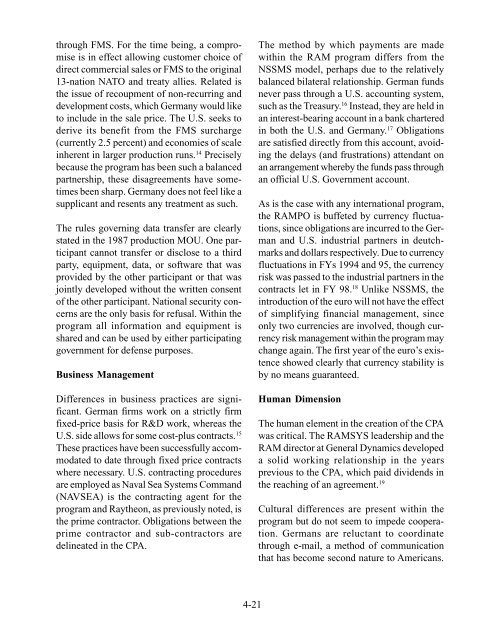Transatlantic Armaments Cooperation - Federation of American ...
Transatlantic Armaments Cooperation - Federation of American ...
Transatlantic Armaments Cooperation - Federation of American ...
You also want an ePaper? Increase the reach of your titles
YUMPU automatically turns print PDFs into web optimized ePapers that Google loves.
through FMS. For the time being, a compromise<br />
is in effect allowing customer choice <strong>of</strong><br />
direct commercial sales or FMS to the original<br />
13-nation NATO and treaty allies. Related is<br />
the issue <strong>of</strong> recoupment <strong>of</strong> non-recurring and<br />
development costs, which Germany would like<br />
to include in the sale price. The U.S. seeks to<br />
derive its benefit from the FMS surcharge<br />
(currently 2.5 percent) and economies <strong>of</strong> scale<br />
inherent in larger production runs. 14 Precisely<br />
because the program has been such a balanced<br />
partnership, these disagreements have sometimes<br />
been sharp. Germany does not feel like a<br />
supplicant and resents any treatment as such.<br />
The rules governing data transfer are clearly<br />
stated in the 1987 production MOU. One participant<br />
cannot transfer or disclose to a third<br />
party, equipment, data, or s<strong>of</strong>tware that was<br />
provided by the other participant or that was<br />
jointly developed without the written consent<br />
<strong>of</strong> the other participant. National security concerns<br />
are the only basis for refusal. Within the<br />
program all information and equipment is<br />
shared and can be used by either participating<br />
government for defense purposes.<br />
Business Management<br />
Differences in business practices are significant.<br />
German firms work on a strictly firm<br />
fixed-price basis for R&D work, whereas the<br />
U.S. side allows for some cost-plus contracts. 15<br />
These practices have been successfully accommodated<br />
to date through fixed price contracts<br />
where necessary. U.S. contracting procedures<br />
are employed as Naval Sea Systems Command<br />
(NAVSEA) is the contracting agent for the<br />
program and Raytheon, as previously noted, is<br />
the prime contractor. Obligations between the<br />
prime contractor and sub-contractors are<br />
delineated in the CPA.<br />
4-21<br />
The method by which payments are made<br />
within the RAM program differs from the<br />
NSSMS model, perhaps due to the relatively<br />
balanced bilateral relationship. German funds<br />
never pass through a U.S. accounting system,<br />
such as the Treasury. 16 Instead, they are held in<br />
an interest-bearing account in a bank chartered<br />
in both the U.S. and Germany. 17 Obligations<br />
are satisfied directly from this account, avoiding<br />
the delays (and frustrations) attendant on<br />
an arrangement whereby the funds pass through<br />
an <strong>of</strong>ficial U.S. Government account.<br />
As is the case with any international program,<br />
the RAMPO is buffeted by currency fluctuations,<br />
since obligations are incurred to the German<br />
and U.S. industrial partners in deutchmarks<br />
and dollars respectively. Due to currency<br />
fluctuations in FYs 1994 and 95, the currency<br />
risk was passed to the industrial partners in the<br />
contracts let in FY 98. 18 Unlike NSSMS, the<br />
introduction <strong>of</strong> the euro will not have the effect<br />
<strong>of</strong> simplifying financial management, since<br />
only two currencies are involved, though currency<br />
risk management within the program may<br />
change again. The first year <strong>of</strong> the euro’s existence<br />
showed clearly that currency stability is<br />
by no means guaranteed.<br />
Human Dimension<br />
The human element in the creation <strong>of</strong> the CPA<br />
was critical. The RAMSYS leadership and the<br />
RAM director at General Dynamics developed<br />
a solid working relationship in the years<br />
previous to the CPA, which paid dividends in<br />
the reaching <strong>of</strong> an agreement. 19<br />
Cultural differences are present within the<br />
program but do not seem to impede cooperation.<br />
Germans are reluctant to coordinate<br />
through e-mail, a method <strong>of</strong> communication<br />
that has become second nature to <strong>American</strong>s.
















